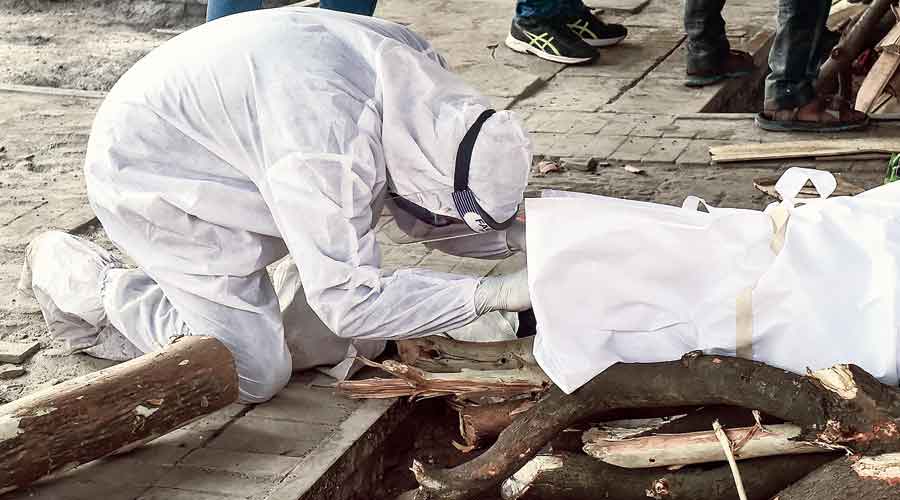India’s Covid-19 deaths may be four to 11 times higher than officially reported and may spawn economic losses equivalent to 30 per cent of the country’s gross domestic product, researchers said on Wednesday after pooling estimates from multiple studies.
The researchers at the University of Michigan and the Delhi School of Economics have surveyed existing studies that suggest that India had lost 1.7 million to 4.9 million people to Covid-19 till July 1, 2021, when the Centre’s count was a little over 400,000.
Their calculations are the latest among a series of independent efforts to estimate excess deaths from Covid-19 across the country using an array of research methodologies amid concerns in health circles that authorities might have vastly undercounted infections and deaths.
“The quality of infection and death reporting remains of great concern for India and masks the true fatality rate,” said Bhramar Mukherjee, professor of biostatistics at the University of Michigan School of Public Health who led the study.
Mukherjee and her colleagues pooled the results of multiple earlier studies to estimate infection fatality rates — the proportion of deaths among the total counts of infections — and Covid-19 deaths.
The calculations from the pooled results have shown cumulative excess deaths in India to be 1.7 million to 4.9 million, with variations across states.
They also used an epidemiological model to generate their own model-based estimate that yielded 1.4 million deaths by July 1.
“If you believe the official reported death numbers, the infection fatality rate is 0.1 per cent, but the pooled results of multiple studies on excess deaths point to a range of 0.4 to 0.5 per cent,” she told The Telegraph via email.
Over the past eight weeks, two other research groups — one based in Canada, the other in the US — have also published reports with Covid-19 death estimates for India ranging from 2.7 million to 4.9 million, implying large undercounting.
The health ministry has rejected such estimates, asserting that India has a “robust” civil registration system for recording deaths and that the ministry has asked states to conduct audits and appropriately report Covid-19 tolls. The ministry has also described reports of undercounted deaths as “totally fallacious” or based on “audacious assumptions”.
The researchers borrowed a concept known as the value of a statistical life (VLS) — independently proposed three years ago by Indian economists S. Madheswaran and Agamoni Majumder — to estimate the economic loss to the country from Covid-19 deaths.
The VLS is a technical economic concept that calculates the value of life based on the risk of fatal accidents at the workplace and wages associated with various jobs.
The estimates peg the notional economic cost of Covid-19 deaths at 9 per cent of the GDP — the sum of all goods and services produced and delivered in India — if the officially recorded deaths are taken into account. The notional cost rises to about 30 per cent of the GDP if the Covid-19 death count is 1.4 million.
“The 7.7 per cent official decline in India’s GDP for 2020-21 is thus a gross underestimate once the value of lives lost is taken into account,” the researchers have said. The Centre’s financial rescue package was about 1 per cent of the GDP, which, they said, is a small fraction of the true losses.
An Indian economist not associated with the study said that while the overall economic loss to the nation was huge, the impact on households merits more research.
“For households that have lost their bread-winners, the impact would be unbearable,” said William Joe, assistant professor at the population research centre at the Institute of Economic Growth, New Delhi. “It is important to explore mechanisms to support such households in distress.”
Their study is yet to be peer-reviewed, but the Michigan-Delhi researchers have posted it on medRxiv, an online archive for research papers.
Sections of health experts have since April this year argued that crowding at funeral sites in multiple cities and bodies dumped in rivers likely reflected large counts of deaths difficult to manage through available crematorium and funeral infrastructure.
The experts believe many Covid-19 deaths have likely remained unrecorded because of lack of access to timely diagnosis, lack of medical certification or inadvertent misclassification of the cause of death.











